Covid-19 world update: Thailand scraps pre-flight Covid tests in tourism push
Thailand is opening its doors to international tourists ahead of its annual New Year holiday festival even as China and Hong Kong lockdown amid Covid breakouts.
World
Don't miss out on the headlines from World. Followed categories will be added to My News.
Travellers to Thailand will no longer have to take a Covid-19 test before boarding the plane under plans to reboot the kingdom’s pandemic-battered tourism sector.
From April 1, the requirement to take a negative test within 72 hours of travel will be scrapped, and instead visitors will be tested on arrival in Thailand, said Taweesin Visanuyothin, spokesman for the country’s Covid-19 task force.
Draconian travel curbs helped Thailand limit Covid-19 case numbers and deaths in the early stages of the pandemic, but hammered its crucial tourism industry, which accounts for about a fifth of the country’s economy.
Thailand’s annual Songkran New Year holiday, however, will remain dry. The traditional public water splashing won’t be allowed, meaning foam parties are still off the menu for now.
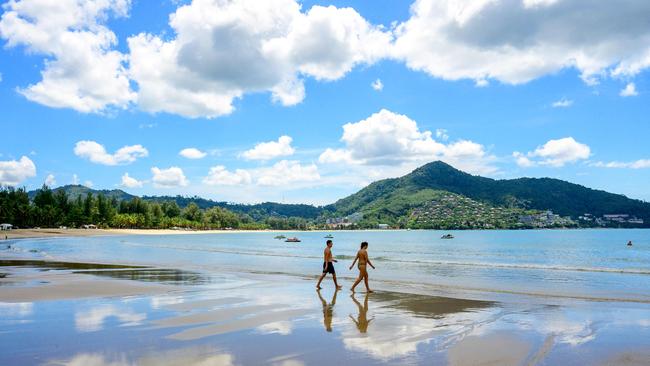
Thailand is currently recording around 25,000 new cases of Covid a day as the Omicron variant spreads around the country, but officials hope this will tail off in time for them to move to a “post-pandemic” phase from July.
Seeking to bounce back from its worst economic performance since the 1997 Asian financial crisis, Thailand has gradually eased travel restrictions over the past nine months.
But hotels, restaurants and other tourist-dependent businesses have urged the government to go further and faster to entice visitors back to the kingdom’s beaches and resorts.
The tourism industry estimates that around five million foreign visitors will travel to Thailand in 2022 — down from nearly 40 million in the year before the pandemic.

Sanan Angubolkul, chairman of the Thai Chamber of Commerce, said restrictions should be eased further to resuscitate the economy.
“Thailand should speed up the virus downgrade to an endemic disease and relax restrictions. The private sector is ready to discuss the matter with the government to support efforts to reopen the country more quickly,” he told the Bangkok Post.
CHINA VOWS TO ACHIEVE ‘COVID ZERO’
As Thailand eases travel restrictions, Chinese President Xi Jinping vowed to “stick with” its zero-Covid strategy amid the country’s largest outbreak since the early days of the pandemic.
“We must always continue to put people and life at the forefront, stick to scientific accuracy and dynamic-zero, and kerb the spread of the epidemic as soon as possible,” Xi said, according to state broadcaster CCTV on Thursday.
Speaking at a meeting of China’s top leaders, he said China must “raise the level of scientifically accurate prevention and control and continuously optimise disease control measures”.
Just three weeks ago China – one of the last nations in the world to stick to a policy of stamping out every Covid case – was reporting under 100 infections daily, but that number has swelled past 1,000 per day for a week.
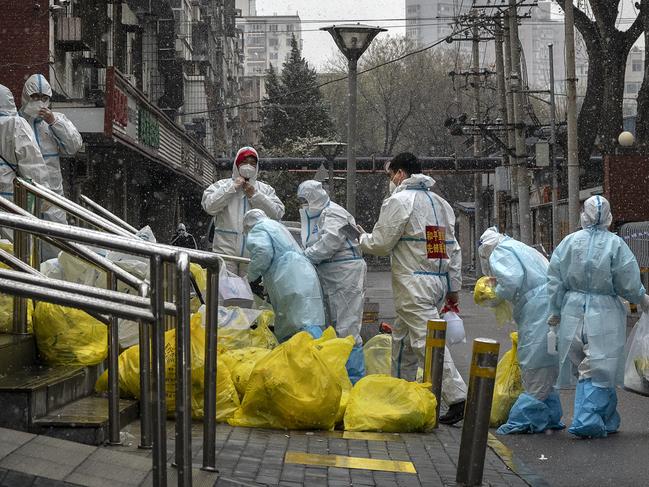
The country where the virus emerged in Wuhan in late 2019 has largely kept it under control since then through strict measures, and has not reported any Covid-related deaths for more than a year.
But the highly transmissible Omicron variant is posing a challenge to the zero-Covid strategy, resulting in cities including the southern tech hub of Shenzhen being locked down and others placed under tight restrictions.
Xi also called on the country to “strengthen technological key areas like vaccination, rapid testing and drug research” to make virus curbs more “targeted”.
The president said there was a need to step up “prevention and control guidance” for severely affected areas, and “swiftly control local clustered outbreaks”, according to CCTV.
He also stressed the need to step up prevention at ports of entry as imported infections rise
MORGUES OVERFLOWING IN HONG KONG
Workers in PPE gear in Hong Kong carted the bodies of coronavirus victims into refrigerated shipping containers on Wednesday local time, as the city’s morgues run out of space from a deadly Omicron surge.
In under three months since the highly transmissible variant broke through, Hong Kong has recorded nearly a million infections and more than 4600 deaths — the bulk of them from the city’s unvaccinated elderly population.

A funeral industry representative told local media the soaring death toll had seen a crunch in the city’s coffins supply, with only 300 remaining and expected to be gone by the weekend.
Leader Carrie Lam acknowledged the supply issues during a press conference, and said two more shipments of coffins will arrive in Hong Kong from the mainland soon.
“I learned from the Food and Health Bureau last night that they are endeavouring to arrange transportation (of coffins) by water,” she said.
She added that officials have been trying to help families concerned about post-mortem affairs, including how to retrieve bodies already transported to public morgues without a doctor issuing a death certificate.
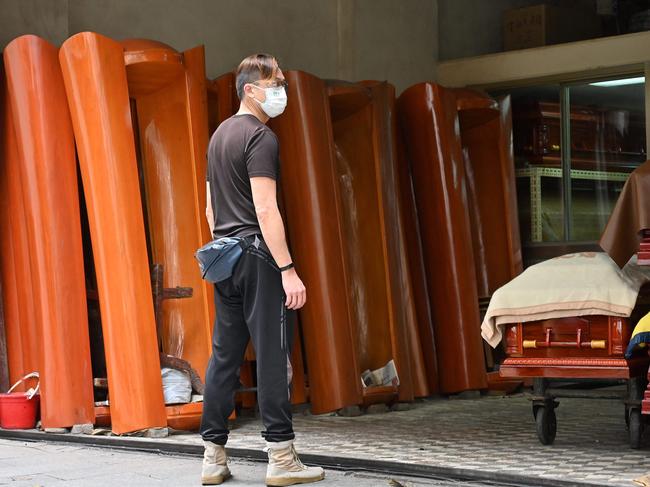
“We will try to find a way for the family to take the body back so that they can arrange the funeral soon. The crematoriums … have also been working day and night at full capacity,” Lam said.
Outside Fu Shan Public Mortuary on Wednesday, workers in full PPE gear moved bodies covered in black tarp from a truck into rows of shipping containers.
Researchers estimate the infection toll in Hong Kong is significantly higher than official figures, likely already reaching half its 7.4 million population.
Lam has taken hits from all sides on her handling of the crisis, with her administration blamed for the spiralling deaths and unclear messaging about a potential lockdown and mass testing.
Chinese social media users have reacted angrily in the past few days, saying the spread of Covid in the mainland is due to Hong Kong’s sluggish epidemic response.
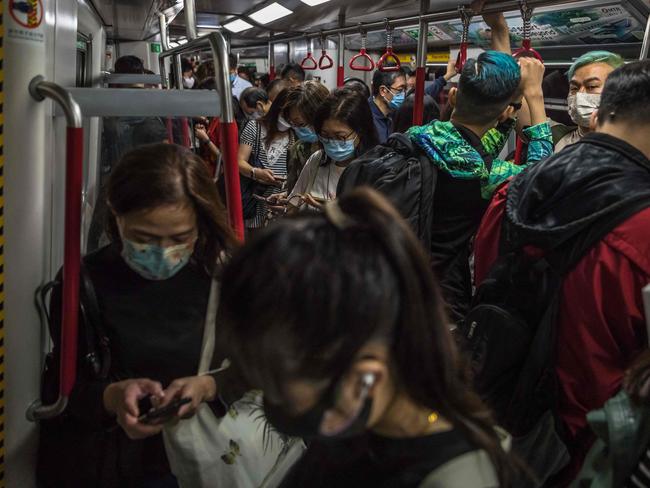
Tens of millions in mainland China were abruptly placed under stay at home orders this week, after the emergence of more than 3,000 daily new cases as Beijing battles to maintain its zero-Covid strategy.
In nearby Shenzhen, all 17.5-million residents were locked down on Monday after an Omicron flare-up in factories and neighbourhoods linked to Hong Kong.
After photos emerged of maskless Hong Kong residents sunning at a beach — which drew vitriol from Shenzhen’s netizens — authorities announced Wednesday that government-managed beaches will be cordoned off starting Thursday.
“As we see a surge of people going to beaches, we have to take appropriate measures in order … to reduce the public’s movements to ensure safety,” Lam told reporters.
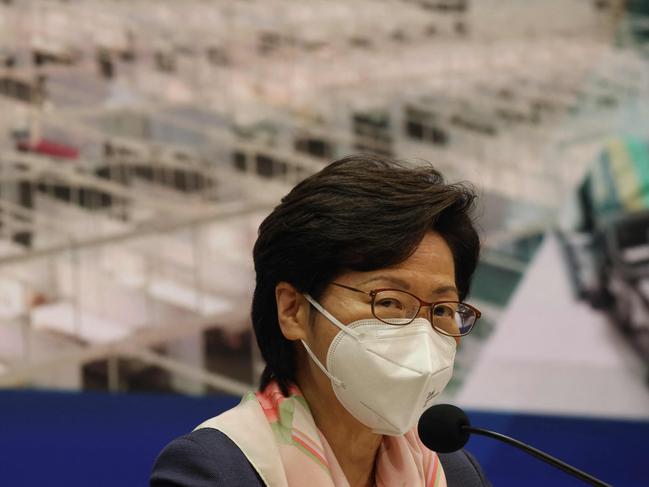
This new measure adds to Hong Kong’s already strict distancing rules, including wearing masks while hiking and a ban on gatherings of more than two.
The embattled chief executive — whose job is up for grabs in a few months — has so far declined to say if she will run for another term.
The selection process was postponed to May because of the wave of Covid cases, and any further postponement would be up to Beijing, Lam said.
OMICRON OUTBREAK SPREADS IN CHINA
It comes as China moved to free up hospital beds as officials reported thousands of new cases from an Omicron-led coronavirus outbreak that has put millions under lockdown and raised fears for the health system.
Just three weeks ago China was reporting under one hundred Covid cases daily, but that number has swelled past 1000 per day for a week.
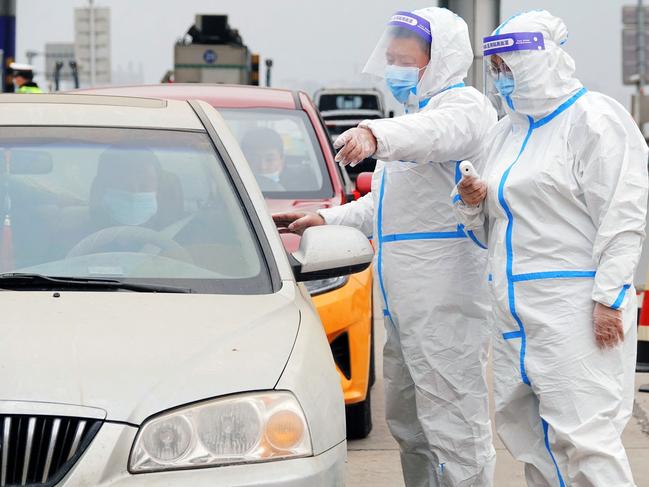
It logged 3290 new confirmed infections on Wednesday, including 11 severe cases.
China, where the virus emerged in Wuhan in late 2019, has largely kept it under control since then through strict measures, and has not reported any Covid-related deaths for more than a year.
But the highly transmissible Omicron variant is posing a stern challenge to its zero-Covid strategy, resulting in the 17.5 million residents of the southern tech hub of Shenzhen being locked down and other cities also under tight restrictions.
Authorities previously sent all patients with any symptoms to specialist hospitals.
But the National Health Commission late Tuesday said patients with mild Covid cases could isolate at a central quarantine facility to ease pressure on hospitals over fears of a looming bed shortage.
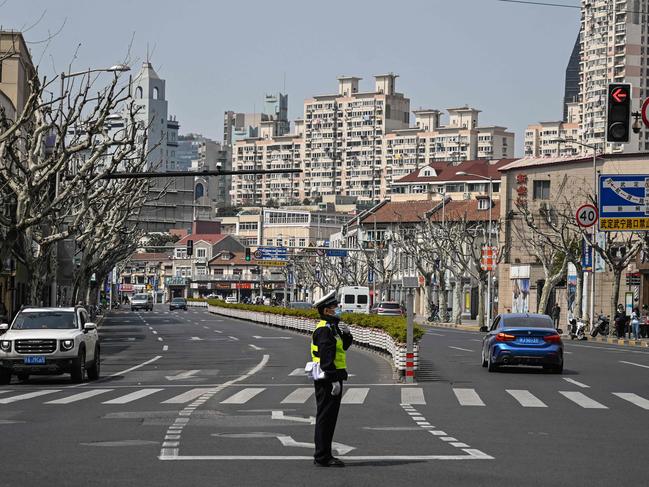
“Patients with Omicron variant strains are mainly asymptomatic infections and mild cases, most of them do not require serious treatment,” the National Health Commission said.
“All admission to designated hospitals will take up a lot of medical resources.” Images of patients lying on gurneys outside hospitals in Hong Kong, where hospitals have been overrun by a surge in cases, have spooked mainland officials, who are now also rushing to build makeshift hospitals in some provinces.
Footage on state broadcaster CCTV Wednesday showed dozens of giant cranes assembling “temporary hospitals” in northeast China’s Jilin province, which has reported more than 5,000 cases over the past week.
The province of more than 24 million residents has only 22,880 hospital beds.
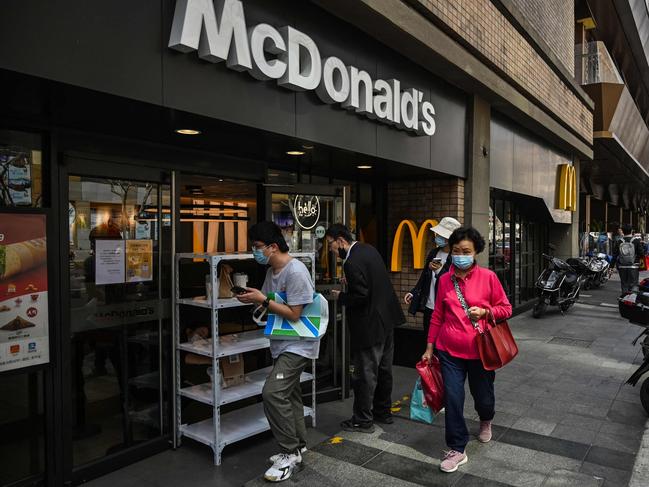
NZ REOPENS BORDERS TO VAXXED AUSSIES
New Zealand will allow vaccinated Aussies to visit without isolating from April 13 as the country reopens its borders to the world after two years spent closed off by the pandemic.
Tourists from visa-waiver countries like the US and UK will be able to arrive from May 2.
Travellers will need to be vaccinated and have test negative in a pre-departure test – but will not be required to isolate upon arrival.
“We’re ready to welcome the world back,” New Zealand Prime Minister, Jacinda Ardern said.
“While we have removed all travel isolation so that tourists will be able to experience the sights and sounds (of Aotearoa) immediately, they will be required to have a pre-departure test.”
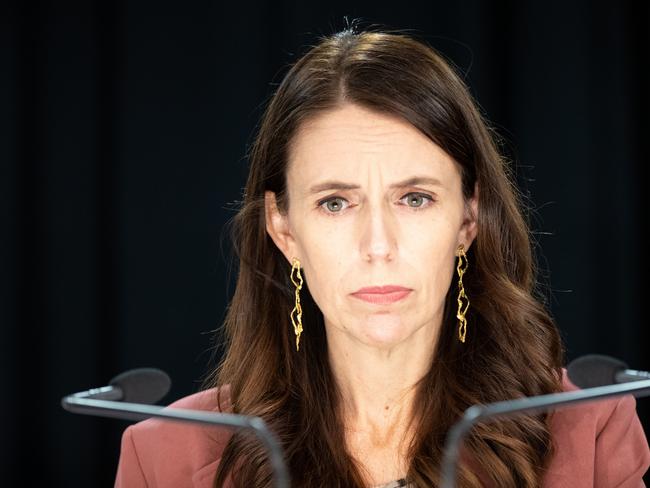
NZ Tourism Minister, Stuart Nash, said the changes would be in place for the Australian school holidays.
“We have missed you,” Mr Nash said, “We are ready to roll out the green and gold carpet to our Australian neighbours, and in time for the school holidays.”
It is now two years since Ms Ardern’s 2020 decision to snap close New Zealand’s borders, as the country’s first outbreak of Covid cases sprung up.
CHINA’S NEW COVID CRISIS
Tens of millions of people are under lockdown across China as surging Covid virus cases prompted the return of mass tests and hazmat-suited health officials to streets on a scale not seen since the start of the pandemic.
China reported 5280 new Covid-19 cases yesterday, more than double Monday’s tally, as the highly transmissible Omicron variant spread across a country that has stuck tightly to a zero-Covid strategy.
That approach, which pivots on hard localised lockdowns and has left China virtually cut off from the outside world for two years, appears stretched to the limit as Omicron finds its way into communities.
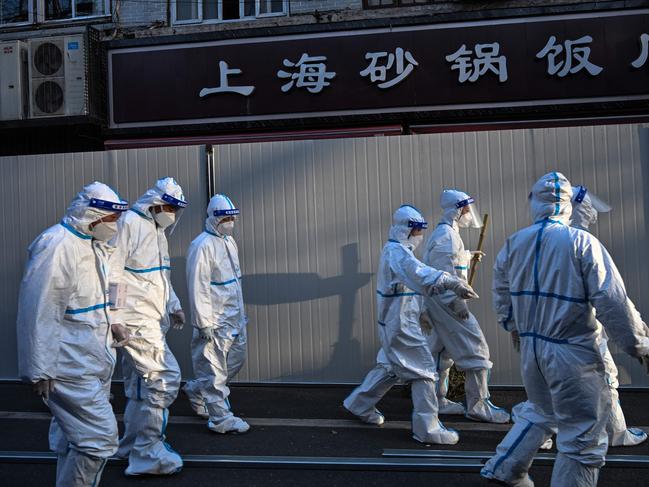
At least 13 cities nationwide were fully locked down as of Tuesday, and several others had partial lockdowns, with some 15,000 infections reported nationwide in March.
Health officials urged people over 60 to get vaccinated — including the third booster jab — as soon as possible.
About 80 per cent of people in that age group are double-vaccinated, according to official data — but Beijing is anxiously watching the situation in Hong Kong, which now has the world’s highest virus death rates due to low inoculation among its oldest residents.
Official Jiao Yahui said at a press briefing Tuesday that “the risk of severe illness is very high” for people in that age group.

‘I PANICKED’
The northeastern province of Jilin has been worst hit by Omicron with over 3000 new cases yesterday, according to the National Health Commission.
Residents of several cities there including provincial capital Changchun — home to nine million people — are under stay-at-home orders.
Health officials said over 8200 Jilin residents have been hospitalised, with the vast majority showing mild or no symptoms.
Shenzhen — the southern tech hub of 17.5 million people — is three days into a lockdown with many factories closed and supermarket shelves emptying, while China’s largest city Shanghai is under a lattice of restrictions.
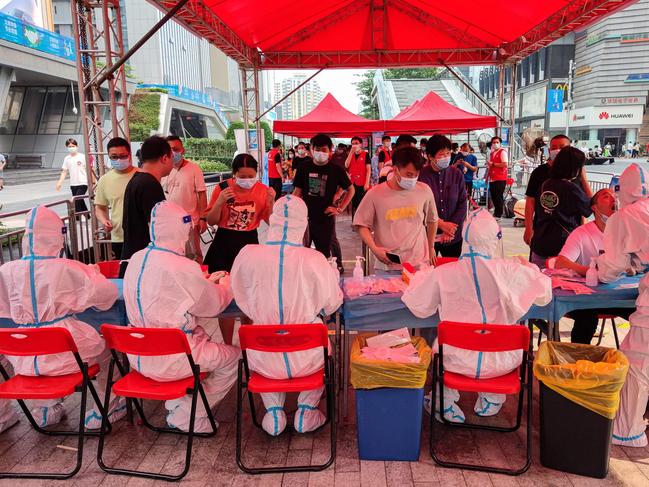
City officials said at a press conference that “it is not necessary to lock down Shanghai at present”, instead opting for more “precise” measures.
Scenes of closed neighbourhoods, panic buying and police cordons cast back to the early phase of the pandemic, which first emerged in China in late 2019.
Although cases from the chaotic initial outbreak in early 2020 are widely believed to have been under-reported, life since then had largely returned to normal in China under its strict zero-Covid approach.
But as lockdowns edge closer to Beijing, public venues have tightened their scrutiny of ubiquitous health QR codes.
From a 21-day home quarantine with her mother and three-year-old child, project manager Mary Yue said she was forced to isolate after cases were linked to a playground they had visited.
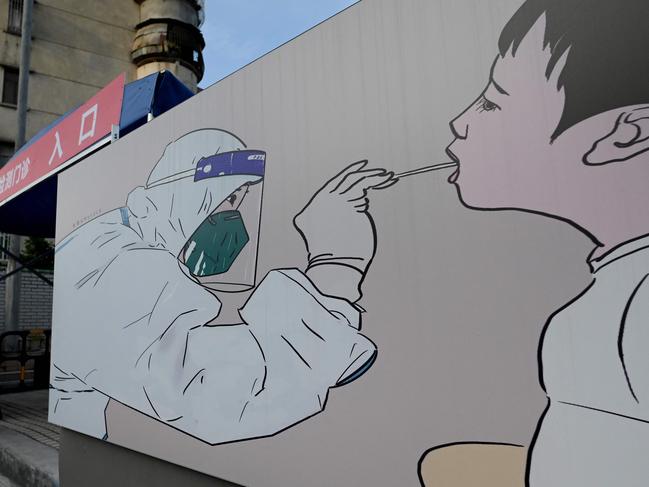
“I panicked when the health officials called … I was afraid they’d take us to a quarantine hotel,” the 34-year-old told reporters.
“But this time they are letting people isolate at home. That’s a huge relief.”
Others expressed exasperation as the pandemic grinds on in China, while much of the world tries to return to normal.
“The control measures were doing pretty well before,” Beijinger Yan told reporters, giving one name.
“And now it starts again, when will it ever end?”
Meanwhile, the coronavirus has killed at least 6,041,660 people since the outbreak emerged in China in December 2019, according to an official tally.
The US has recorded the most Covid deaths with 967,552, followed by Brazil on 655,078 and India with 515,877.
Taking into account excess mortality linked to Covid, the World Health Organisation estimates the true death toll could be two to three times higher.
FRANCE DROPS MASK MANDATE, VAX PASSES
France dropped the need for mandatory vaccine passes to enter public spaces in the latest move to lift Covid lockdowns, even as new breakouts shut down major cities across Asia.
President Emmanuel Macron announced a fourth dose of a coronavirus vaccine would be offered to people older than 80 as the country dropped it vaccine pass.
The proof that someone has been triple vaccinated against the illness had previously been required to enter public spaces such as cinemas or restaurants.
A similar pass will however be needed to go to a hospital or a retirement home in order to protect the most vulnerable.
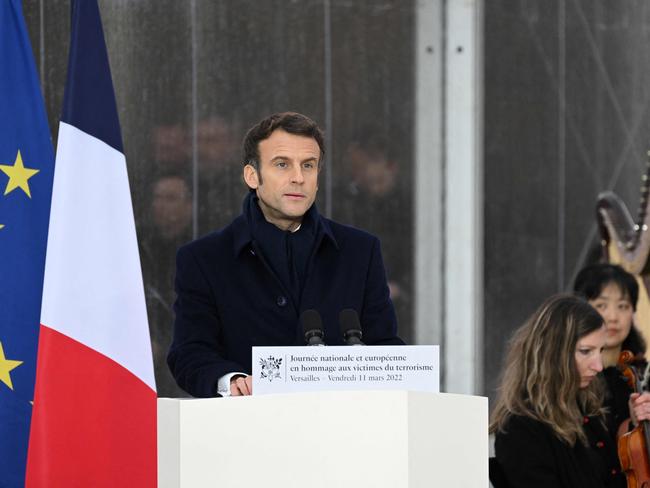
Masks will now only be required on public transport, and no longer be necessary at work or in school.
France has recorded more than 23 million cases of Covid-19 on its soil, more than 140,000 of which were fatal.
Macron is likely to point to his handling of the pandemic as he campaigns for re-election in polls next month, though Russia’s war on Ukraine has largely overshadowed the campaign.
OBAMA TESTS POSITIVE FOR COVID
Barack Obama has tested positive for a mild case of Covid-19, the former US president said on his Twitter account Sunday.
“I’ve had a scratchy throat for a couple days, but am feeling fine otherwise,” Obama tweeted, adding that his wife, former first lady Michelle Obama, has so far tested negative.
“Michelle and I are grateful to be vaccinated and boosted,” he wrote.
Obama, plus fellow former presidents Jimmy Carter, George W. Bush, Bill Clinton – and the former first ladies – appeared together in a one-minute video released last March, endorsing the US vaccination campaign and sharing what they missed about pre-pandemic life.
“This vaccine means hope,” Obama said in the video.
“It will protect you and those you love from this dangerous and deadly disease.”
I just tested positive for COVID. I’ve had a scratchy throat for a couple days, but am feeling fine otherwise. Michelle and I are grateful to be vaccinated and boosted, and she has tested negative.
— Barack Obama (@BarackObama) March 13, 2022
It’s a reminder to get vaccinated if you haven’t already, even as cases go down.
In August, Obama scaled back his 60th birthday celebrations due to the spread of the Delta variant of the coronavirus.
Conservative political opponents had lashed out at the former president for planning to host an outdoor party – in which attendees were required to be vaccinated – that had been expected to draw hundreds of guests after Democrats had criticised Donald Trump’s administration for organising several maskless events at the White House.
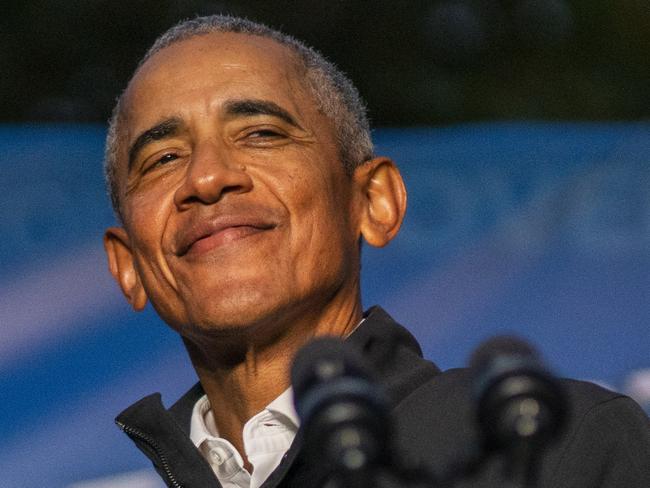
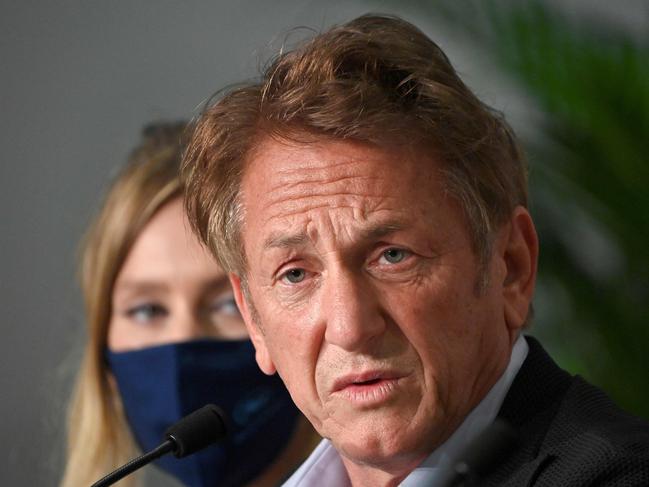
Obama reiterated his support for the vaccine in his tweet Sunday, saying his own positive test was “a reminder to get vaccinated if you haven’t already, even as cases go down.”
Despite a vocal anti-vaccination constituency in the country, the US Centers for Disease Control and Prevention (CDC) say more than 80 per cent of all people ages five and older in the United States have had at least one Covid-19 vaccine dose.
US daily case counts have fallen off sharply, according to the (CDC), with an average of around 35,000 cases per day in mid-March compared to a peak of an average of 810,000 cases per day in mid-January.
Meanwhile, actor Sean Penn has also tested positive to Covid after returning from Ukraine.
Paul Thomas Anderson announced the news from the stage during Saturday night’s DGA Awards at the Beverly Hilton while explaining Penn’s absence to present an award.
But on Sunday morning, a representative for Penn told The Hollywood Reporter that it may have been a false positive.


